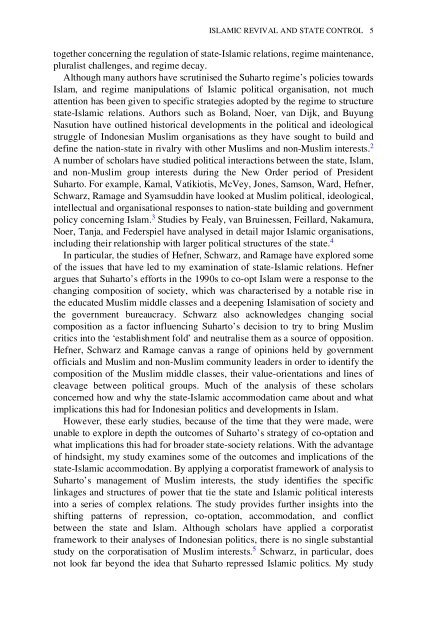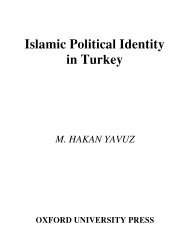Create successful ePaper yourself
Turn your PDF publications into a flip-book with our unique Google optimized e-Paper software.
ISLAMIC REVIVAL AND STATE CONTROL 5together concern<strong>in</strong>g the regulation of state-<strong>Islam</strong>ic relations, regime ma<strong>in</strong>tenance,pluralist challenges, <strong>and</strong> regime decay.Although many authors have scrut<strong>in</strong>ised the Suharto regime’s policies towards<strong>Islam</strong>, <strong>and</strong> regime manipulations of <strong>Islam</strong>ic political organisation, not muchattention has been given to specific strategies adopted by the regime to structurestate-<strong>Islam</strong>ic relations. Authors such as Bol<strong>and</strong>, Noer, van Dijk, <strong>and</strong> BuyungNasution have outl<strong>in</strong>ed historical developments <strong>in</strong> the political <strong>and</strong> ideologicalstruggle of <strong>Indonesia</strong>n Muslim organisations as they have sought to build <strong>and</strong>def<strong>in</strong>e the nation-state <strong>in</strong> rivalry with other Muslims <strong>and</strong> non-Muslim <strong>in</strong>terests. 2A number of scholars have studied political <strong>in</strong>teractions between the state, <strong>Islam</strong>,<strong>and</strong> non-Muslim group <strong>in</strong>terests dur<strong>in</strong>g the New Order period of PresidentSuharto. For example, Kamal, Vatikiotis, McVey, Jones, Samson, Ward, Hefner,Schwarz, Ramage <strong>and</strong> Syamsudd<strong>in</strong> have looked at Muslim political, ideological,<strong>in</strong>tellectual <strong>and</strong> organisational responses to nation-state build<strong>in</strong>g <strong>and</strong> governmentpolicy concern<strong>in</strong>g <strong>Islam</strong>. 3 Studies by Fealy, van Bru<strong>in</strong>essen, Feillard, Nakamura,Noer, Tanja, <strong>and</strong> Federspiel have analysed <strong>in</strong> detail major <strong>Islam</strong>ic organisations,<strong>in</strong>clud<strong>in</strong>g their relationship with larger political structures of the state. 4In particular, the studies of Hefner, Schwarz, <strong>and</strong> Ramage have explored someof the issues that have led to my exam<strong>in</strong>ation of state-<strong>Islam</strong>ic relations. Hefnerargues that Suharto’s efforts <strong>in</strong> the 1990s to co-opt <strong>Islam</strong> were a response to thechang<strong>in</strong>g composition of society, which was characterised by a notable rise <strong>in</strong>the educated Muslim middle classes <strong>and</strong> a deepen<strong>in</strong>g <strong>Islam</strong>isation of society <strong>and</strong>the government bureaucracy. Schwarz also acknowledges chang<strong>in</strong>g socialcomposition as a factor <strong>in</strong>fluenc<strong>in</strong>g Suharto’s decision to try to br<strong>in</strong>g Muslimcritics <strong>in</strong>to the ‘establishment fold’ <strong>and</strong> neutralise them as a source of opposition.Hefner, Schwarz <strong>and</strong> Ramage canvas a range of op<strong>in</strong>ions held by governmentofficials <strong>and</strong> Muslim <strong>and</strong> non-Muslim community leaders <strong>in</strong> order to identify thecomposition of the Muslim middle classes, their value-orientations <strong>and</strong> l<strong>in</strong>es ofcleavage between political groups. Much of the analysis of these scholarsconcerned how <strong>and</strong> why the state-<strong>Islam</strong>ic accommodation came about <strong>and</strong> whatimplications this had for <strong>Indonesia</strong>n politics <strong>and</strong> developments <strong>in</strong> <strong>Islam</strong>.However, these early studies, because of the time that they were made, wereunable to explore <strong>in</strong> depth the outcomes of Suharto’s strategy of co-optation <strong>and</strong>what implications this had for broader state-society relations. With the advantageof h<strong>in</strong>dsight, my study exam<strong>in</strong>es some of the outcomes <strong>and</strong> implications of thestate-<strong>Islam</strong>ic accommodation. By apply<strong>in</strong>g a corporatist framework of analysis toSuharto’s management of Muslim <strong>in</strong>terests, the study identifies the specificl<strong>in</strong>kages <strong>and</strong> structures of power that tie the state <strong>and</strong> <strong>Islam</strong>ic political <strong>in</strong>terests<strong>in</strong>to a series of complex relations. The study provides further <strong>in</strong>sights <strong>in</strong>to theshift<strong>in</strong>g patterns of repression, co-optation, accommodation, <strong>and</strong> conflictbetween the state <strong>and</strong> <strong>Islam</strong>. Although scholars have applied a corporatistframework to their analyses of <strong>Indonesia</strong>n politics, there is no s<strong>in</strong>gle substantialstudy on the corporatisation of Muslim <strong>in</strong>terests. 5 Schwarz, <strong>in</strong> particular, doesnot look far beyond the idea that Suharto repressed <strong>Islam</strong>ic politics. My study




